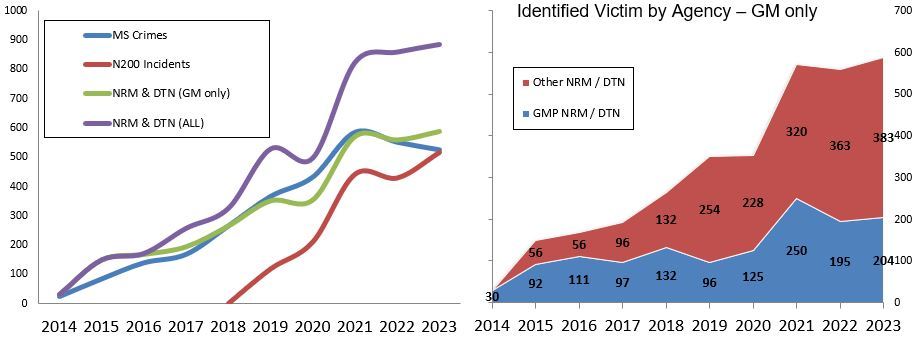
For more information about
Programme Challenger please email:
info@programmechallenger.co.uk
In an emergency, where there is a
threat to life or a crime in progress,
always phone 999

The Modern Slavery Unit (MSU) was established in March 2015. Prior to this time the knowledge and extent of modern slavery within Greater Manchester was largely unknown. As a result, one of the focuses of the Unit is to identify what modern slavery looks like within Greater Manchester and capture some key statistics to help track how things change over time and develop our understanding of this complex and evolving issue. The aim of this section is to provide an insight to professionals and the public. Feel free to use the contact section if you have any questions or suggestions as to what is provided here.
A trend that can be clearly identified from the figures is that numbers are increasing year on year in relation to modern slavery in Greater Manchester. However care should be taken when making sense of figures and what they tell us. This does not necessarily mean that modern slavery is increasing in Greater Manchester, indeed professional judgement would suggest that it isn't. A more plausible explanation is that as we understand modern slavery more and raise awareness both professionally and within the community our detection of modern slavery will improve and so numbers of cases will increase whilst this happens.
Prior to Modern Slavery Unit (MSU)
| 2012 | 2013 | 2014 |
| 2 | 15 | 22 |
Correct to 01/01/2024
| 2015 | 2016 | 2017 | 2018 | 2019 | 2020 | 2021 | 2022 | 2023 |
| 82 | 137 | 166 | 263 | 364 | 430 | 583 | 549 | 523 |
The NRM and DTN is the official nationally recognised system for identifying a victim of modern slavery. The figures before includes all referrals made by either the police or other first responders for victims of modern slavery in the Manchester area (excluding all referrals for exploitation outside of Manchester)
Correct to 01/01/2024
| 2012 | 2013 | 2014 | 2015 | 2016 | 2017 | 2018 | 2019 | 2020 | 2021 | 2022 | 2023 |
| 9 | 18 | 30 | 148 | 167 | 193 | 264 | 350 | 353 | 570 | 558 | 587 |
We work with a range of partners across Greater Manchester to gain a better understanding of what modern slavery looks like and what the experience of victims is. Below is some information to update you on some activity partners are doing in this area.
Trilateral Research, a leading research and technology development company, together with the eminent University of Manchester will be building Greater Manchester’s capacity to combat slavery, human trafficking and exploitation. We are calling this Honeycomb. It will take place over three years and will:
The project is funded by the Greater Manchester Combined Authority [GMCA] and is part of the city-region’s responsibility to take a robust approach to slavery and human trafficking.
“Modern slavery and human trafficking is happening now across Greater Manchester. To prevent and tackle this scourge, we need to be able to understand how it happens. We know that not every victim or survivor will want to report their experience to the police, but there might be organisations, businesses and service providers who have important pieces of information that can help protect those people who are trapped. This information can be safely shared, without breaking a survivor’s confidentiality, to help us to understand the methods exploiters use to trap victims. This is why we are investing in this partnership with Trilateral Research and the University of Manchester, so that we can better understand the problem, enabling us to work together to prevent modern slavery from happening, safeguard victims and bring more perpetrators to justice"
Bev Hughes, Greater Manchester’s Deputy Mayor for Policing, Crime, Criminal Justice and Fire
Honeycomb will help GMCA and our partners take action on the vast amounts of data that is spread across different stakeholders, integrate disparate data sources and make the best possible use of the data while respecting best legal and ethical-practice. The project will use Trilateral’s data analysis platform – STRIAD® - their expertise in data protection, privacy, ethics and explainable AI, along with the University of Manchester’s rich research methods, ethical processes and expertise to gain a true insight into human trafficking and modern slavery. Building on these insights, Honeycomb will run a series of campaigns and help the city-region intelligently and creatively protect people from the crimes of human trafficking and modern slavery as well as interrupting traffickers’ activities. The partnership is an expansion of each partner’s long history of work in the anti-human trafficking and modern slavery sector.
West Midlands Anti-Slavery Network have worked with communities, enforcement agencies and support organisations to develop culture guides for frontline practitioners who are working with people from Albania or Vietnam. You can access these guides via the West Midlands Anti Slavery Network website.
Albania and Vietnam Culture booklets
If you have any queries about data and intelligence on modern slavery or would like discuss data sharing feel free to contact - Christopher.Geneux@gmp.police.uk

Please note:
Work of Programme Challenger - November 2023
Project Launches to combat Modern Slavery - July 2021
Manchester Evening News (MEN) Article - November 2020
About Manchester Article - October 2020
Page updated 01/01/2024 - Christopher Geneux, Data Manager